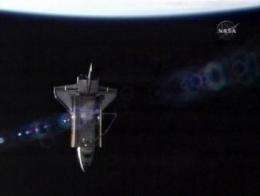Space shuttle Atlantis close to 120 million miles

(AP) -- Space shuttle Atlantis closed in on the 120 million-mile mark as its final voyage neared an end and astronauts inspected their ship in advance of Wednesday's landing.
The laborious survey was carried out Monday using a newly repaired instrument that scanned Atlantis' wings and nose for damage. NASA saved the inspection until the shuttle was flying free of the International Space Station.
Atlantis undocked from the space station Sunday for the last time, leaving behind a new 20-foot compartment loaded with supplies and six fresh batteries. The shuttle program is ending in another several months, and Atlantis has no more missions lined up.
Before signing off, lead flight director Mike Sarafin radioed the astronauts and told them everyone was ecstatic with their work over the past 1 1/2 weeks.
"The ride out of the barn that you took with Atlantis, we did some math here on the ground," Sarafin said. By the time Atlantis gets to Kennedy Space Center, "the odometer on Atlantis will have crossed 120 million miles," he noted.
Atlantis will hit that milestone early Wednesday, just eight hours ahead of the scheduled 8:48 a.m. touchdown. Discovery is the fleet leader with more than 142 million miles, followed by Columbia with more than 121 million miles.
"It's because of guys like you, and the men and women who built Atlantis and maintain her and fly her and her sister ships, that we're able to peacefully explore," Sarafin told the crew. "We look forward to the return of our fair ship Atlantis, as well as your return."
Shuttle commander Kenneth Ham replied that 120 million miles is "pretty darn awesome in my mind."
When Atlantis rocketed into orbit May 14, it had logged 115.7 million miles in a quarter-century of flight. This trip will add 4.8 million miles after 186 orbits of Earth, if the shuttle lands on time.
At a news conference, Sarafin noted that it's possible Atlantis may set sail once more. "We'll just have to see how the budget and schedule play out, given the direction that the agency has," he said.
Unless the White House grants a reprieve, though, this is it for Atlantis. Only two more shuttle flights are scheduled, by Discovery and Endeavour. NASA officials will decide in another week or two whether the fall launch dates are feasible, or how long any delays might be, said LeRoy Cain, chairman of the mission management team.
As for Atlantis, Cain said time will tell whether this was its last flight. "I'll know that for sure when Atlantis shows up in a museum somewhere," he said. "Until then, we're focused on this mission and taking them one at a time."
NASA is under presidential direction to get out of the business of launching astronauts into orbit around the Earth and, instead, focus on sending them to asteroids and Mars. The Obama administration would like private business to pick up the slack. Until that happens, NASA astronauts will continue catching rides to and from the space station on Russian rockets.
Since this is likely to be Sarafin's last time leading a shuttle flight control team, he will fly from Houston to Florida for Atlantis' homecoming.
Sarafin noted that Atlantis was at the heart of cooperation in space between Russia and the United States in the years after the Cold War ended. It made seven trips to Russia's old Mir space station during the 1990s, and has made 11 flights to the International Space Station.
"The shuttle has been a remarkable vehicle in that it has served as a peaceful means of exploring," Sarafin said
This 32nd flight of Atlantis saw Russia's Rassvet compartment delivered to the space station. That's Russian for Dawn.
Monday morning's inspection was a direct result of the 2003 Columbia disaster.
As is the case on every flight since then, the astronauts used a 100-foot, laser-tipped inspection boom to check Atlantis' heat shield for any micrometeorite damage. The wings and nose are especially vulnerable during re-entry, enduring the most heat.
A snagged cord prevented the astronauts from conducting a thorough survey earlier in the flight. The cable was untangled during a spacewalk last week, and Mission Control said everything worked perfectly Monday.
©2010 The Associated Press. All rights reserved. This material may not be published, broadcast, rewritten or redistributed.





















